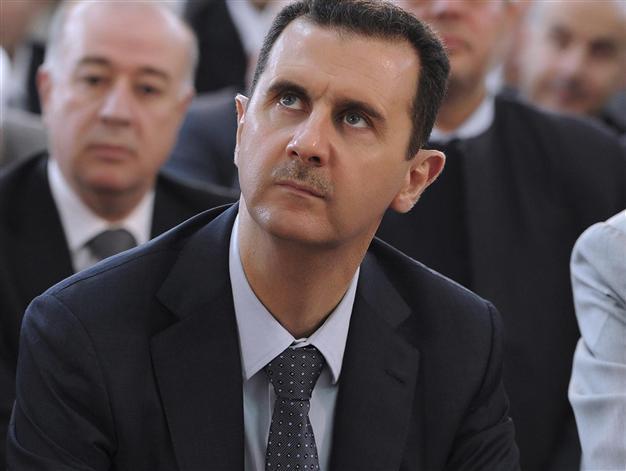Syria's Assad to make rare public address
DAMASCUS - Agence France-Presse

REUTERS/Sana/Handout
Syria's embattled President Bashar al-Assad is to make a rare public address Sunday expected to focus on the uprising against his rule in which according to the UN more than 60,000 people have died.
The expected speech comes as Patriot missiles are deployed along the Turkish border in a move the US military said was to help Turkey defend itself against any threat from Syria, which is in the throes of a 21-month civil war.
"President Bashar al-Assad will deliver a speech on Sunday morning on the latest developments in Syria and the region," the official SANA news agency said late on Saturday, without specifying what time he will speak.
Assad last spoke in public on June 3 when he addressed parliament in Damascus. In November he gave an interview to Russian television in which he dismissed suggestions he would go into exile, saying said he would "live and die" in Syria.
The pro-Syrian Lebanese daily, Al-Akhbar, said Assad was ready to offer a "solution" to the conflict.
Citing anonymous sources, the paper said Assad may submit a five-point plan that would not preclude him from contesting the next presidential election when his current term ends in 2014.
The plan also provides a ceasefire, allowing international observers to monitor its application, a constituent assembly to draft a new constitution, forming a national government and holding free elections for a new parliament, it said.
During his latest visit to Damascus, UN-Arab League peace envoy Lakhdar Brahimi had mentioned a plan, based on the Geneva declaration, that talked of a ceasefire, forming a government and holding parliamentary and presidential polls.
The Geneva plan put forward last June would see a transitional government in place, but it does not refer to Assad going -- a condition the opposition insists on.
The Syrian authorities have not responded directly to Brahimi's proposals, which the envoy believes could be adopted by the international community, but have said that they are ready to respond to any plan through dialogue.
NATO-member Turkey, a one-time Damascus ally, has become one of its most vocal opponents over the conflict in its southern neighbour, and on Saturday the deployment began of US Patriot missiles near its border with Syria.
The US will transport some 400 troops to Turkey in the coming days to operate two Patriot batteries, the Germany-based US European Command said.
They will be based at Gaziantep, 50 kilometres (31 miles) north of the border.
Germany, The Netherlands and the United States agreed to supply the ground-to-air missile batteries which Turkey requested after repeated cross-border shelling from Syria, including an October attack that killed five civilians.
The Patriot systems are expected to become operational later this month.
Syria's allies Iran and Russia oppose the Patriot deployment, fearing that it could spark a regional conflict that also draws in NATO.
Arab heavyweights Saudi Arabia and Egypt called on Saturday for a "peaceful" solution to the crisis. Both Riyadh and Cairo have urged Assad to quit.
Foreign Minister Ali Akbar Salehi of Iran is due in Cairo on January 9 for talks on the crisis, Iranian media reports said on Saturday.
Violence on the ground continued unabated, with the Syrian Observatory for Human Rights on Sunday reporting that Syrian troops bombarded rebel positions on the outskirts of the capital overnight, including in Beit Saham near the Damascus airport road, the southwest town of Daraya and Douma to the northeast.
The army has in recent weeks sent reinforcements in a bid to regain control of Daraya, the scene of the bloodiest massacre of the conflict in which hundreds were killed in late August. In Deir Ezzor in eastern Syria, fighting erupted between rebels and troops overnight as the army bombed several neighbourhoods of the provincial capital, according to the Britain-based Observatory.
